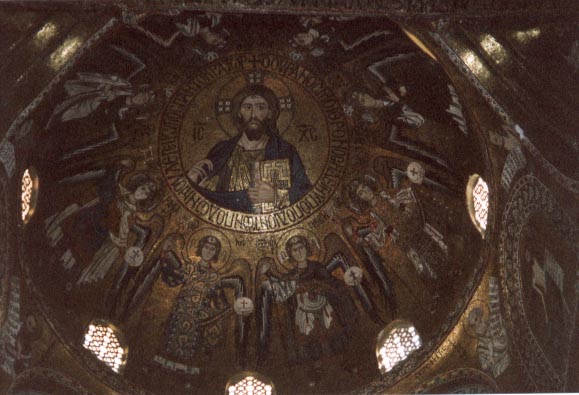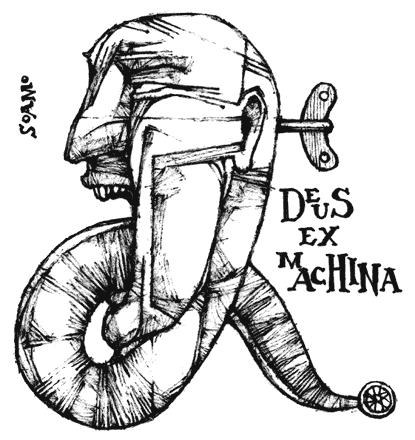Serendip is an independent site partnering with faculty at multiple colleges and universities around the world. Happy exploring!
Continuing Middlesex
Notes Towards Day Five of
Critical Feminist Studies
I. Packets to distribute: $$ in envelope
Begin using/reading in it after finish w/ Middlesex
Story of the cover
II. Learn the names of the ppl. on your left and right;
go 'round and teach the rest of us.
III. Get into five groups of four: tell each other the story of
the first time you realized you were gendered.
IV. What did we learn from these accounts?
What are the marks of gender?
What are the mechanics of being gendered?
How are they enforced?
Steph: Fear of the 'unknown' or 'in between,' for the most part, is human (and animal) nature, which categorization attempts to absolve.
egleichm: perhaps with more flexiblity of sex, we can more easily understand our gender.
ebock: it does seem like with the advent of scientific/sociological/etc. evidence pointing towards a spectrum/mulitiplicity of sexes and genders, there needs to be some serious efforts towards broadening the space within "feminism"....I really enjoy the idea of creating a feminism that works towards breaking down the strict male/female dichotomy that exists in our culture....The only obstacle I find myself facing is trying to imagine what happens to the identity of those who really embraced being a "woman"....is there still room to be inclusive of those who are womanist/woman-identified?
Y'day, talking about "Obama, Race and the Election", Bob Washington (Sociology)
described "three orientations in black politics":
1) ethnic (civil rights: aimed @ black community, not able to go national)
2) outlier (black conservatives in think tanks, media, academia, without a base in the black community)
3) melder (using cultural capital to go beyond the civil rights legacy and reach middle class white voters)
"this the only effective strategy, to frame black problems universally"
Obama is avoiding a race-specific agency, enlarging the issues to address context of class
(he knows, but won't highlight, problems in inner cities, knowing he can't afford the old strategy)
fear is that his election will provide a rational for dismantling social justice programs
direct parallel to shifts in feminist-identity politics?
compare, for example: PUMA-Power: The Confluence
& Woman Against Sarah Palin
V. Okay, back to literature....
What are the marks of gender in Middlesex?
When/where/how does gender enter the Stephanides family?
Two spheres with separate concerns, duties, even--
the evolutionary biologist might say--thought patterns." (p. 92)
(Prior to Cal's evolution) what complicates this binary/refuses this categorization?
95: What does it mean to be human in the world of this novel?
"Historical fact: people stopped being human in 1913...we've all inherited it to some degree, so that we plug right into joysticks and remotes, to repetitive motions of a hundred kinds. But in 1922 it was still a new thing to be a machine."
98: "'Don't try to be a speed king. you understand? we all have to work faster that way.'"
(cf. Middlemarch re: "marching in the middle"/fitting in)
106: What do we make of Cal's a-political position?
"I happen not to be a political person. I don't like groups....
I live my own life and nurse my own wounds.
It's not the best way to live. But it's the way I am."
Does Cal see it that way?
Father Mike and Milt about the value of storytelling:
"...in the old country people ..'ll believe whatever stories the priests tell them. Here it's different. You can go to college and learn to think for yourself."
"The church doesn't want people not to think....thinking will take a person only so far. Where thinking ends, revelation begins."
"I'd say where thinking ends, stupidity begins."
My mother...couldn't fail to notice the stark contrasts....On one side, faith; on the other, skepticism (179).
I want to give you another back-story, another frame-story, for Middlesex,
perhaps even more important than that of Tiresias.
It's a religious story.
to inseminate Tessie.

Was it told to you, growing up?
How was it told to you?
How do you now tell it?
I want to suggest that this story, of continuous re-birth, is Cal's story--
and with it, to suggest that literary stories may differ from scientific ones,
in that the new do not replace (though they may alter and update) the old.
We acknowledge our historical roots, in a way that science's stories,
with their emphasis on replaceability, do not.
(And where are the social scientists on this spectrum?)
Back to the archetype....
The cultural evolution of his story began w/ the blind Greek prophet Tiresias
who was given second sight. Tiresias is (among other things) a prototype for Christ.
"And I Tiresias have foresuffered all / Enacted on this same divan or bed"
(T.S. Eliot, The Wasteland, ll.243-244).
Christ is "open" and "peripatetic."
He is also all-seeing:

From Travel in Sicily
In his 3 a.m. interview about the novel, Eugenides was asked,
"If you would pick an image that reflects the spirit of Middlesex, what would it be?"
the only...visual artifact that I had to the book was actually the interior of a Greek Orthodox Church. They are very gaudy in many respects, iconography on all of the walls. There's a lot of activity in the same way there's a lot of activity in Middlesex and in all of the characters. There are very bright spots and there's also many dark spots where you have the lamps swinging, smoking and a litany of pray....There usually is also a dome, and across the dome you'll find the Christ Pantocrator, who's transcendent, looking down on the partisans and on creation. In a way, I think my narrator as a Christ Pantocrator. So, the idea of something very colorful and swirling with light, with a dominant intelligence screening over, was the image that I had in my mind....


Remember the moment when Milt receives his reprieve as a signalman?
He was to report to the Naval Academy at Annapolis.
On the admissions test, Milton had scored a ninety-eight.
Every Greek drama needs a deus ex machina (196).

Go on reading through Book III...
it's like a maze: so much to make sense of.
Be your own Ariadne...
bring your own thread.


